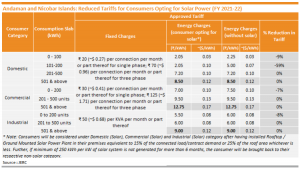The Joint Electricity Regulatory Commission (JERC) has announced the energy and fixed charges for rooftop and ground-mounted solar in the Andaman and Nicobar Islands for the financial year 2021-22. This was notified through a retail power tariff order for the financial year (FY) 2021-22.
Last year, the Commission had reduced the charges for domestic, commercial, and industrial categories to incentivize them to install solar systems on their roofs and other available areas.
The Commission has approved a tariff hike of 3.36% for FY 2021-22 over the tariff for FY 2020-21. The Commission has also approved the average billing rate for FY 2021-22 as 6.85 (~0.093)/kWh as against the approved average cost of supply of 29.51 (~$0.40)/kWh. The revenue gap will be 22.66 (~$0.31)/kWh.
The Electricity Department of Andaman & Nicobar Islands has confirmed that the approved standalone revenue gap of ?4.75 billion (~$64.78 million) would be borne by the Administration of Andaman & Nicobar Islands, with budgetary support from the Government of India.
This order will come into force from June 1, 2021, and remain valid until further orders.
This year, the Commission has retained the tariffs for consumption slabs in the range of 0-100 units, 101-200 units, and 201-500 units for domestic, commercial, and industrial users.
However, the Commission has increased the tariffs by 13% for domestic and commercial users and by 7% for industrial users, specifically those who consume more than 500 units of power.
In FY 2020-21, the tariff was 7.5 (~$0.1)/kWh for domestic consumers, with consumption above 500 units; for FY 2021-22, the tariff has been hiked to 8.5 (~$0.12)/kWh FY 2021-22. Tariff for commercial users consuming over 500 units was 12 (~$0.16)/kWh in FY 2020-21, which was raised to 12.75 (~$0.17)/kWh this year. Similarly, the tariff for industrial users was 8 (~$0.11)/kWh in FY 2020-21, increased to 9 (~$0.12)/kWh for FY 2021-22.
Renewable purchase obligation (RPO)
For the FY 2021-22, the Commission has approved the RPO target of 39.43 MU, comprising 18.56 MU solar and 20.88 MU non-solar. The Electricity Department of Andaman & Nicobar Islands had claimed to purchase solar energy of around 23.70 MU and non-solar energy of 10.56 MU, thereby resulting in a shortfall in RPO compliance of 10.32 MU for non-solar.
The Commission had noted that there is a net shortfall of 5.18 MU in RPO compliance for FY 2021-22 and a cumulative shortfall of 17.18 MU until FY 2021-22. The Commission has directed the Electricity Department of Andaman & Nicobar Islands to complete the RPO obligation on priority.
Last month, the Commission had announced the generic tariffs for solar photovoltaic, wind, and small hydro projects in Goa, and the UTs of Andaman & Nicobar Islands, Lakshadweep Islands, Puducherry, Daman & Diu, Dadra & Nagar Haveli, and Chandigarh.
Rooftop and Ground-mounted solar
There is a 59% reduction in energy charges for residential rooftop solar with the power consumption range of 100- 200 kWh, as the consumer has to pay only 2.05 (~$0.03)/kWh compared to 5 (~$0.07)/kWh in the same category without solar. This provision is unchanged from the previous financial year.
 The consumers will be considered for reduced energy charges under the domestic, commercial, and industrial solar categories only if they have installed rooftop or ground-mounted solar power projects in their premises equivalent to 15% of the connected load or 25% of the roof area (whichever is less). In addition, if a minimum of 250 kWh per kW of the solar system is not generated for more than six months, the consumer will h brought have to pay energy charges as levied for the non-solar category.
The consumers will be considered for reduced energy charges under the domestic, commercial, and industrial solar categories only if they have installed rooftop or ground-mounted solar power projects in their premises equivalent to 15% of the connected load or 25% of the roof area (whichever is less). In addition, if a minimum of 250 kWh per kW of the solar system is not generated for more than six months, the consumer will h brought have to pay energy charges as levied for the non-solar category.
Electric Vehicles
The energy charges for electric vehicle charging stations will remain at ?6.90 (~$0.09)/kWh, as the previous year. Fixed charges continue to be exempt.
Subscribe to Mercom’s real-time Regulatory Updates to ensure you don’t miss any critical updates from the renewable industry.
Power Tariff Hike for Consumers in Andaman & Nicobar Islands, Sops for Solar Continue
JERC raises tariffs by 13% for domestic and commercial users and by 7% for industrial users, specifically those who consume more than 500 units of power
Source:MERCOM
ViaRahul Nair






